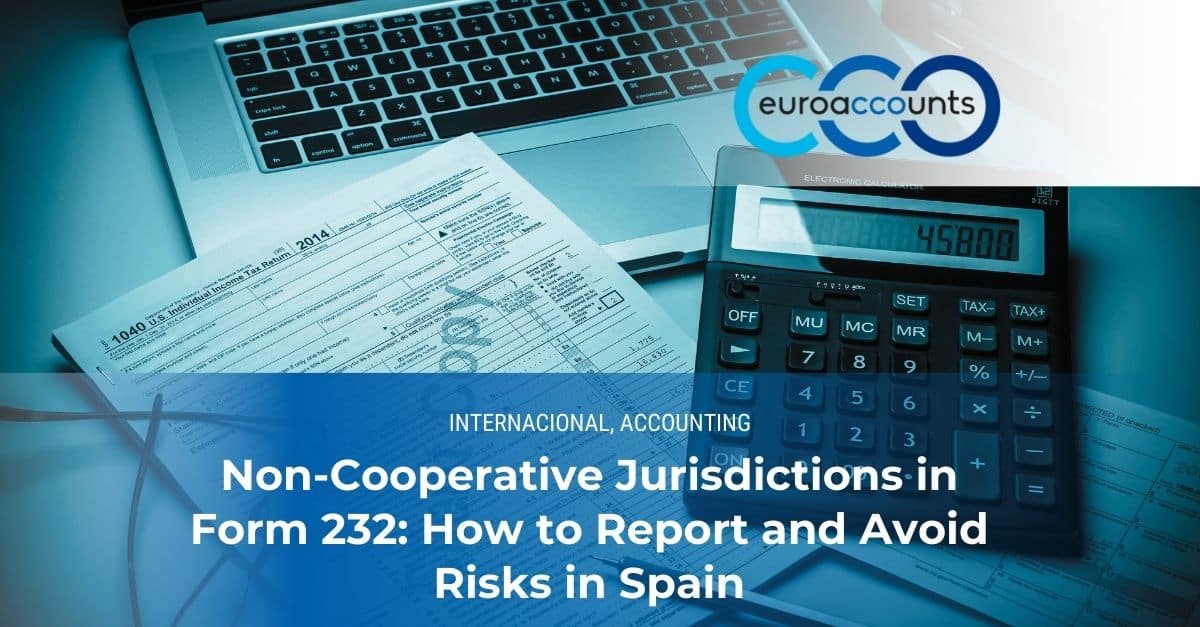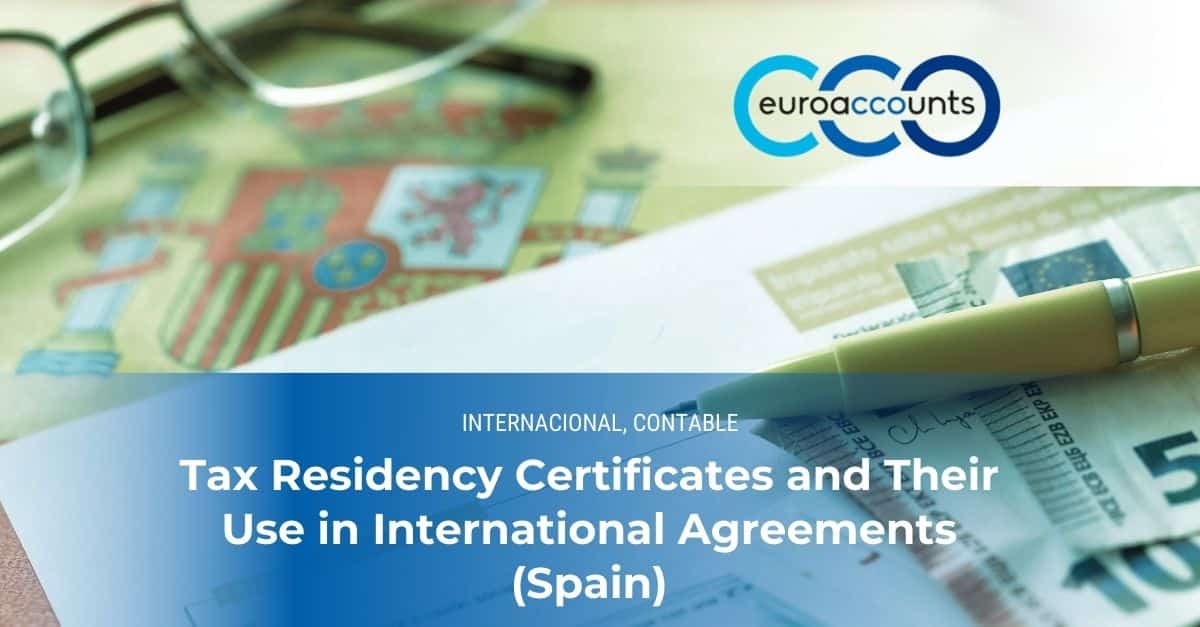Form 232 is one of the most critical reporting obligations for multinational companies operating in Spain. It is designed to increase transparency in transfer pricing and to monitor economic flows with non-cooperative jurisdictions.
Many CFOs and tax managers are unaware of the thresholds, timing, and scope of the form. Moreover, incorrect or incomplete submissions can trigger substantial penalties or lead to audits and transfer pricing adjustments.
This article provides a practical overview of Form 232: who must file it, what transactions to include, what risks to watch for, and how to align this form with other key documents like the Local File and the Corporate Income Tax Form 200.
Do you manage a subsidiary in Spain? Discover how EUROACCOUNTS helps multinational groups avoid errors and strengthen their fiscal compliance strategy.
What is Form 232?
Origin and purpose
Form 232 is an informative declaration required by the Spanish Tax Agency (AEAT) to control related-party transactions and economic dealings with non-cooperative jurisdictions. It was introduced through Order HFP/816/2017 and aligns with OECD’s BEPS recommendations and EU transparency measures.
Its main purpose is to identify risks in transfer pricing and potential tax base erosion, especially in operations between subsidiaries and parent companies or with foreign entities under preferential tax regimes.
Legal context and Spanish regulations
The obligation to file Form 232 arises from Article 13.4 of the Spanish Corporate Income Tax Regulations. It complements documentation obligations such as the Master File and Local File. Filing the form does not exempt companies from keeping full documentation of their related-party transactions.
Given the dynamic nature of Spanish tax law, it is essential to consult the AEAT website (www.aeat.es) to verify the latest applicable regulations each year.
Who must file Form 232?
All companies that meet specific thresholds for related-party transactions or conduct operations with non-cooperative jurisdictions must submit Form 232. This includes subsidiaries of international groups, Spanish permanent establishments of foreign companies, and local firms with cross-border operations.
Related-party transactions and applicable thresholds
Linked entities: what qualifies?
According to Spanish tax law, related-party transactions are those carried out between entities under common control or with significant influence over each other. This includes operations between a parent company and its subsidiary, between two subsidiaries of the same group, or between companies and their directors or partners.
These transactions must be valued at arm’s length, that is, the price that would be agreed upon between independent entities under similar conditions.
Thresholds of €250,000 and €100,000
Form 232 must be filed when certain monetary thresholds are exceeded:
- €250,000 per counterparty and type of transaction: Calculated at market value, aggregating all transactions of the same type (e.g., services, sales, loans) with a given related party.
- €100,000 per individual transaction: This applies to specific transactions such as transfers of intangibles or business restructurings, as defined in Article 13.3 of the Corporate Income Tax Regulations.
It is crucial to group and analyze transactions by type and counterparty to determine whether these thresholds are met.
Coordination with Local File and CIT Form 200
Form 232 must be consistent with the information reported in the Local File and the Form 200 (Corporate Income Tax). Discrepancies may trigger audits or adjustments by the AEAT, such as income reallocation or tax base corrections.
For example, if a loan to a foreign subsidiary is declared in the Local File but omitted in Form 232, it may be flagged as non-compliance.
Dealings with non-cooperative jurisdictions and fiscal transparency
What jurisdictions are considered non-cooperative?
Non-cooperative jurisdictions are defined by Royal Decree 1080/1991 and the EU list of non-cooperative jurisdictions for tax purposes. These jurisdictions are characterized by lack of transparency, absence of exchange of information agreements, or facilitation of aggressive tax planning.
The list is regularly updated and available on the Spanish Tax Agency (AEAT) website and the EU Council website. Before filing Form 232, it is essential to consult the most recent list to determine whether any counterparties fall under this classification.
Threshold of €36,000 and declaration criteria
All transactions with entities located in non-cooperative jurisdictions must be reported in Form 232 if their total market value exceeds €36,000 per year, according to Order HFP/816/2017.
Even if transactions fall below this threshold, it is recommended to document them properly to ensure transparency and compliance with transfer pricing principles.
How to declare payments, royalties, loans or services
The form requires declaring any payments, royalties, loans, services, or financial operations conducted with non-cooperative jurisdictions. Each transaction must be itemized, indicating the nature, amount, and counterparty involved.
Example: A Spanish subsidiary paying €50,000 in consulting fees to a provider in a non-cooperative jurisdiction must report this transaction in Form 232, even if there is no corporate link between the entities.
Note: Non-cooperative does not imply illegality, but it increases the level of scrutiny and reporting obligations.
Main structure of the form: key sections
Block I: Related-party transactions
This section includes all transactions with linked parties that exceed the legal thresholds. Each transaction must be specified with:
- Type of transaction: Services, sale of goods, financial loans, royalties, etc.
- Counterparty: Identification of the related entity (name, country, tax ID).
- Amount at market value.
- Valuation method used: Accepted methods include Comparable Uncontrolled Price (CUP), Cost Plus, Transactional Net Margin Method (TNMM), Profit Split, or Residual Valuation Method. The method should match the justification in the Local File.
Block II: Dealings with non-cooperative jurisdictions
This section details all operations with entities in jurisdictions listed as non-cooperative, provided they exceed the €36,000 annual threshold. The form requires the nature of the transaction, the jurisdiction, and the total amount.
Block III: Valuation methods and transfer pricing policy
This section summarizes the valuation criteria used across the reported transactions. It must align with what is documented in the Local File and be consistent with the group’s global transfer pricing policy.
Deadlines and how to file Form 232
Filing period and deadlines
Form 232 must be submitted between November 1 and November 30 of the year following the fiscal year in which the related-party transactions or dealings with non-cooperative jurisdictions were carried out.
For example, for fiscal year 2024 (ending December 31, 2024), the form must be filed between November 1 and November 30, 2025.
How to file it electronically
The form is filed exclusively online through the AEAT website using a digital certificate. The system validates the data structure and prevents submission if required fields are missing or thresholds are not properly specified.
The platform also allows for complementary or corrective filings if errors or omissions are detected after the initial submission.
What happens if the deadline is missed?
Missing the deadline can result in significant penalties, even if the company has no tax liability. Additionally, non-compliance increases the risk of audit and reputational damage for the group.
Late submissions without prior notice may also limit access to tax benefits or hinder the defense in case of inspections.
Penalties for omission or error
Up to €10,000 or 1% of undeclared amounts
Non-compliance with Form 232 obligations may lead to substantial penalties regulated by the General Tax Law:
- €1,000 per incorrect or omitted data point, with a minimum of €3,000 per declaration.
- A maximum of €10,000 per set of incorrect data.
- Up to 1% of the total value of the undeclared transaction.
In cases of wilful misconduct, repeated offences, or lack of cooperation with the AEAT, penalties can be increased, and further investigations may be triggered.
Case example: French industrial group
One of our clients, a French industrial company with a subsidiary in Spain, failed to report an €800,000 intra-group loan in Form 232. Although the transaction was documented in their Local File, it was omitted from the filing.
The AEAT imposed an initial penalty of €8,000 (1% of the transaction value), which was later reduced to €4,000 following a voluntary corrective filing. However, this omission led to a warning notice and a follow-up audit the following year.
Common mistakes and how to avoid them
Incomplete or inconsistent information
One of the most frequent mistakes is submitting Form 232 with data that is inconsistent with the Local File or Form 200 (corporate income tax return). These inconsistencies can lead to tax audits or adjustments.
For example, reporting a royalty payment in the Local File but omitting it from Form 232 may result in an adjustment for lack of market value justification.
Misunderstanding declaration thresholds
Many companies wrongly calculate the reporting thresholds:
- The €250,000 threshold refers to the market value of transactions with the same counterparty, grouped by type of operation (e.g., services, goods, loans).
- The €100,000 threshold applies to specific transactions on an individual basis, such as transfers of intangibles or business restructurings (Article 13.3 of the Corporate Tax Regulation).
Risk of tax adjustments due to discrepancies
Errors in Form 232—such as omissions or incorrect valuations—can lead to transfer pricing adjustments by the AEAT. For instance, if an intra-group loan is not at arm’s length, the tax authority may reassign revenue or expenses, increasing the company’s tax burden.
The AEAT uses Form 232 to select companies for audits
Form 232 is a strategic tool for the AEAT to identify potential audit targets, especially in sectors exposed to transfer pricing risks such as technology, pharmaceuticals, and financial services.
A well-prepared form not only ensures compliance but also reduces the likelihood of inspection.
From risk to control: your roadmap in related-party operations
Form 232 is more than a compliance obligation: it is a window into your group’s transfer pricing policy. For multinational groups operating in Spain, it is a critical component of tax transparency and a preventive tool against audits and financial penalties.
Aligning Form 232 with the Local File, Form 200, and the group’s global documentation is essential to maintain control and consistency. At EUROACCOUNTS, we help international companies ensure this alignment, offering specialized support in Spanish, English, and French to facilitate internal coordination.
We also assist in data collection from ERP systems, provided the client has compatible infrastructure and necessary integrations — which may require investment in software or external providers.
Important: The form must be submitted exclusively in Spanish, as required by the AEAT. However, our multilingual support ensures understanding at all levels of the organization.
Do you have doubts about your group’s obligations with Form 232? Contact us for a preliminary review with no obligation.
Frequently Asked Questions about Form 232
What is Form 232 and who must file it?
Form 232 is an informative declaration required in Spain for companies that carry out related-party transactions or transactions with entities in non-cooperative jurisdictions. It must be filed electronically with the AEAT.
What are the reporting thresholds for related-party transactions?
The form must be filed if total transactions with the same counterparty exceed €250,000 (by market value) per type of operation. Additionally, certain specific operations (e.g., transfers of intangibles) must be declared if they individually exceed €100,000.
Are all transactions with non-cooperative jurisdictions reportable?
No. Only transactions that exceed €36,000 (market value) per year must be declared. However, it is recommended to document all dealings for traceability and audit purposes.
What are the penalties for errors or omissions?
Penalties range from €1,000 per incorrect or omitted data point (with a minimum of €3,000 per return), up to 1% of the undeclared amount. In cases of wilful misconduct or repeated non-compliance, penalties may be increased.
Can EUROACCOUNTS assist with Form 232?
Yes. EUROACCOUNTS helps multinational companies prepare, validate, and file Form 232, aligning it with your Local File and ERP data, and providing support in Spanish, English, and French.





